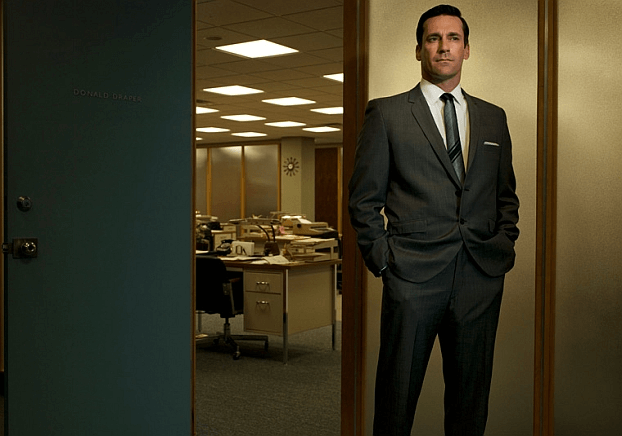There’s a reason why Mad Men is one of the most recognized and heralded shows on television. Heavy with atmosphere and featuring some of the best writing in recent history, the show has gained a legion of devoted fans since first premiering in 2007.
While every character is full of depth, there’s no getting past the likability of Mad Men’s lead Don Draper (played by Jon Hamm).
Draper is the embodiment of the fast and cutthroat world of New York advertising agencies in the 1960s, giving the character an authentic feel that is rarely seen on the small screen.
With the series coming to a close in 2015, Mad Men has regained its spot in the limelight as people analyze its characters more than ever.
One constant that can’t be ignored is just how much Don Draper has to teach about business. The show may be set half a century in the past, but every lesson Draper has to offer remains pertinent to today’s business climate. For those interested in rising in the ranks of the professional world, studying Don Draper can be more beneficial than anyone might have otherwise thought.
Here are 17 things Don Draper teaches us about business, all of which are worth paying attention to.
1. Focus on the “need behind the need.”
There’s always a reason why a potential new client might approach you and your business. It may be that they’re in need of branding or a logo, or in the case of another industry, reliable IT support or some type of software. What often goes overlooked, though, is the importance of looking past what a client is asking for and identifying the “need behind the need.”
Why is the client in search of branding or IT support? Perhaps they’ve had a hard time getting their business off the ground or have suffered crippling IT issues in the past. Recognizing the true source of a client’s needs is the only way to truly provide them with the product or service that is right for them, not to mention the fact that it will help show that you’re adept at what you do.
2. Learn to hold your liquor.
The four martini business lunch is probably just as common today as it was in the ’60s. Hell, I’ve done it. Some professionals find this to be the best way to get a client on their side, and it’s definitely an effective method that’s not to be ignored.
It can also be dangerous, however, especially if you’re unable to hold your liquor like a true professional. Get too drunk at a client meeting and you might end up saying something that causes you to lose an account, which is every professional’s nightmare. It may not seem important, but at the very least, make sure you’re aware of your limits.
3. Don’t turn down the chance to move up.
Don Draper may be viewed as one of the most successful smooth-talkers in business, but he wasn’t always that way. Without transitioning from Dick Whitman to his new assumed identity, he would’ve never risen to the top and became such a revered man.
The opportunity to “upgrade” one’s life/career should never be passed up, even if it seems as if the scenario is scary or intimidating. After all, not everyone has the option to move up in the world, regardless of how hard they work for what they have. If a chance comes your way, take it.
4. Remember the true purpose of advertising.
Without advertising, it’d be next to impossible to find success in the professional world. Even if what you’re offering is of the highest quality, no one is going to jump onboard if they don’t know about it.
What sets Draper apart from the rest of the world, is that he has a strong handle on the true purpose of advertising. It’s not necessarily about trying to prove to an audience that they need something, but rather that the “something” at hand will provide them with true happiness. Everyone strives to be happy in life, and billboards/television ads can have a powerful psychological effect when carefully put together.
If your advertising doesn’t put consumer happiness at the forefront, you’re doing it wrong.
5. Embrace change with open arms.
If there’s one aspect of life that just about everyone can agree on, it’s that change is inevitable. It’s a constant in relationships, in business and in every other aspect of life — fighting for permanence is a losing battle.
Sometimes change can seem good, while other times it can appear to be detrimental. The most important thing to remember is that change isn’t necessarily good or bad; it just “is.”
Navigating through life can be difficult enough as it is, but you’ll have a much harder time if you don’t learn to roll with the punches. No matter what kind of change occurs, human beings are exceptional in their ability to adapt. Keep this in mind the next time you find yourself in a crisis situation.
6. Mix things up if they’re not working.
It’s not always easy to sell a product or service, especially those which are relatively unknown. Sometimes it takes years of trial and error to figure out that something isn’t working for you, which can seem like wasted time. Count this as a blessing, however, as this realization is the first step towards success.
If you feel as if you’ve been swimming against the tide trying to market or sell something, chances are it’s time to switch up your technique. A simple shift in a new direction can make a world of difference, and the moment you see this in action, you’ll quickly learn that flexibility is key in any industry of business.
7. Use nostalgia as a tool.
Think back to the Season One episode in which Draper used a carousel slideshow as a marketing device for Kodak. Draper wasn’t selling the camera itself, but instead tapping into the hearts and minds of the audience by providing a deep sense of nostalgia.
For whatever reason, nostalgia has an immensely powerful effect on human beings, perhaps as a result of the fact that some things from the past can never again be had. Today, nostalgia can be seen all over the advertising landscape, especially in commercials from Apple and its competitors. It may seem at first like a cheap shot, but the moral of the story is that nostalgia can be a secret weapon when properly used in marketing.
8. Bear in mind the importance of face-to-face communication.
In today’s world, there are more communication options than ever in the past. Between video chat, cell phones and email, you’re never really more than a few seconds away from contacting anyone in the world. It’s a huge factor in business and can be quite positive, but it’s not without its negative effects.
Because virtual communication has in many ways become a standard, many professionals believe they don’t need to schedule in-person meetings any longer. The importance of face-to-face communication should never be forgotten as it can make or break certain decisions in business.
In the end, there’s something about being in the same room as someone and looking into their eyes as you attempt to strike a deal that simply cannot be replaced by Skyping.
9. Leave the past behind.
For many people, the past can bring back dark memories. Even those who are happy with where they are in life have often done things that they aren’t proud of, which can be haunting in certain scenarios. If this sounds familiar, you’ll do best to keep in mind the fact that the past is just that.
So long as whatever may have happened years ago no longer has an effect on your career, it’s best to view it as ancient history. Recognizing the current state of your career is the only way to truly be present, ignoring whatever setbacks may have caused you issues before.
For some people, it takes therapy. Others, though, can benefit from simply having a positive attitude and pushing forward rather than taking steps backward.
10. Don’t let relationships influence your career.
Anyone who has watched Mad Men from day one knows that Don Draper has had his fair share of headaches as a direct result of the relationships he’s been in. Just take a look at Betty Draper, for example, his batty ex-wife who almost cost him his career as a result of her antics.
Most people want to be in a supportive relationship that will assist them in pushing their career in a forward direction, but sometimes it’s important to remember that certain relationships can be nothing more than toxic. And depending on the circumstances, it can be difficult to recognize this at face value.
If you feel as if your relationship is affecting your career in a negative manner, it might be time to pull the plug.
11. Take regret and spin it around.
The “could’ve, should’ve, would’ve” adage is more common in business than most people like to admit. Missed opportunities can be depressing to think about, especially if the payout might have been truly worth the risk.
Just because you’ve made a mistake or two doesn’t mean you can’t learn from this and use it as fuel to move forward. Instead of sitting with regret and dwelling on things that might have been, take a moment to analyze what happened. Why didn’t something pan out, and how could you have maybe changed the outcome. This way, you’ll be far more ready to tackle a similar scenario the next time it pops up than you were before.
An introspective mind can be a powerful thing, especially if you’re trying to climb the professional ladder.
12. Don’t just talk about things — get them done.
Meetings and other business-related conversations can be essential in helping to steer your team in the right direction when tackling a project. One of the most toxic aspects of business is that following up on and executing these discussions sometimes takes a backseat.
You can talk about ways to pitch a new client till the cows come home, but you’ll never get the account if you don’t put in the work. Staying on task isn’t always easy though, and it’s possible to lose sight of what you’re doing when you’ve had a long work day.
Take a moment each hour to reflect on what you’ve gotten done and what still requires your attention, and put the time into checking things off your list.
13. Think like your customers.
So many people in business think that the key to a successful marketing campaign is to prove to consumers that they need a product or service in their life. There’s certainly something to this concept, but it doesn’t even nearly paint the whole picture.
One thing that is constant in Draper’s style of work is that he recognizes the importance of thinking like his customers. Getting into the heads of your audience will directly influence how you build a campaign, thus affecting whether or not it will be successful.
Ask yourself “if I was a consumer, why would I want to buy this?”
It may lead to even more questioning (and perhaps some dead ends), but this is how a benchmark campaign is created.
14. Delegate tasks, but don’t relinquish responsibility.
Leading a team can be one of the most difficult aspects of being a successful professional. On one hand, those who are motivated to rise to the top often want to handle every part of a project on their own. This can lead to a great deal of problems however, as taking on too much without the assistance of others usually causes burnout.
Bearing this in mind, it’s important to also remember that you are the one responsible for the end result of a project. If things don’t turn out the way you expect them to, you can’t really blame this on the people who are working for you.
Delegating tasks is a great way to ensure that you’re not trying to bite off more than you can chew, but never do so with the assumption that you aren’t the one who is inevitably responsible for the outcome.
15. Stay fashion-focused and look the part.
It may seem egotistical or vain to put a lot of focus on your fashion sense, but there’s no ignoring the fact that the way you dress matters in business. After all, you would never show up to an important client meeting wearing jeans and a t-shirt, no matter how lax your policy might be.
Don Draper is one of the best-dressed men on television, and his sense of style (while somewhat outdated) adds a great deal to the character. You don’t need to go out and buy an entirely new wardrobe, but having a few key pieces at your fingertips for meetings and business lunches will make a great deal of difference in terms of how you’re viewed not only by clients and customers, but by colleagues and employees as well.
16. Master the art of “crisis PR.”
Think back to the episode in which Don Draper lost the Lucky Strike account. It’s a situation that every professional finds themselves in at one point or another — a crisis, if you will.
What did Draper do? He went against popular opinion and penned a letter to the Times explaining his decision to no longer take on tobacco accounts, regardless of how good the money may be. This move not only helped to soften the blow of losing the account, but put the agency in a good light to those who were against the use of tobacco.
It’s a genius technique that can only be described as “crisis pr,” and it’s one of the most important things that anyone in business can learn how to embrace.
17. Take responsibility when things aren’t going your way.
The last and perhaps most important thing to learn from Don Draper about business is that everyone should be held accountable for their own success and happiness in life.
Many people in the world of business feel as if they’re not getting a fair shot at life. They may work for someone they can’t stand, for example, or feel like they’re being heavily underpaid.
To Draper, sitting around and complaining isn’t going to change a thing. If you’re unhappy with your job, quit and find a new one.
Having relationship issues? Get out of the relationship or fix them.
Being the change that you want to see made is an essential part of finding success in all aspects of life, and it applies to business in more ways than are possible to count.
—
If you haven’t yet plunged into the world of Mad Men, you’ve still got time. I think the seasons are on Netflix and Amazon Prime. It took me a few episodes for it to catch on, but after those I was hooked.
For now, start putting these lessons to work — if you do, it’ll be only a matter of time until you rise to the top.




























 info@axerosolutions.com
info@axerosolutions.com 1-855-AXERO-55
1-855-AXERO-55


